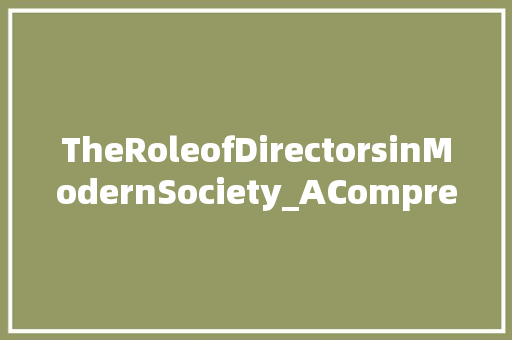Introduction
In today's fast-paced and ever-evolving society, the role of directors has become increasingly significant. Directors, whether in the corporate, entertainment, or non-profit sectors, play a pivotal role in shaping the future of organizations and societies. This article aims to explore the responsibilities, challenges, and impact of directors in modern society, highlighting the importance of their leadership and strategic thinking.

I. The Responsibilities of Directors
1. Visionary Leadership
Directors are responsible for setting the vision and direction of their organizations. They must have a clear understanding of the industry, market trends, and future challenges to guide their teams towards success. A visionary leader inspires and motivates their team to achieve common goals, fostering a culture of innovation and continuous improvement.
2. Strategic Decision-Making
Directors are tasked with making critical decisions that impact the organization's future. These decisions involve analyzing market conditions, financial performance, and stakeholder expectations. By leveraging their expertise and experience, directors ensure that their organizations remain competitive and sustainable.
3. Governance and Compliance
Directors are responsible for ensuring that their organizations operate ethically and in compliance with applicable laws and regulations. They must establish effective governance structures, implement risk management strategies, and promote transparency and accountability.
II. Challenges Faced by Directors
1. Economic Uncertainty
The global economic landscape is characterized by volatility and uncertainty. Directors must navigate through economic downturns, political instability, and technological disruptions to ensure the stability and growth of their organizations.
2. Technological Advancements
The rapid pace of technological advancements presents both opportunities and challenges for directors. They must stay abreast of new technologies and their potential impact on their organizations, ensuring that they leverage these advancements to drive innovation and efficiency.
3. Stakeholder Expectations
Directors must manage diverse stakeholder expectations, including shareholders, employees, customers, and the community. Balancing these expectations while maintaining the organization's core values and long-term objectives can be a challenging task.
III. The Impact of Directors
1. Economic Growth
Effective directors contribute to economic growth by fostering innovation, creating jobs, and driving industry development. Their strategic decisions and leadership can have a significant impact on the overall economic landscape.
2. Social Responsibility
Directors play a crucial role in promoting social responsibility within their organizations. By prioritizing ethical practices, sustainability, and community engagement, directors can make a positive impact on society.
3. Talent Development
Directors are responsible for attracting, developing, and retaining top talent. By investing in employee training and career development, directors can build a strong and capable workforce that drives organizational success.
Conclusion
In conclusion, directors play a vital role in modern society. Their responsibilities, challenges, and impact are multifaceted, encompassing visionary leadership, strategic decision-making, governance, and social responsibility. As the world continues to evolve, the role of directors will become even more critical in shaping the future of organizations and societies. By embracing their responsibilities and navigating the challenges, directors can make a meaningful difference in today's complex and dynamic environment.









